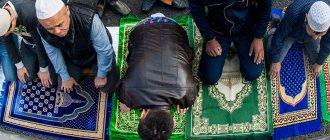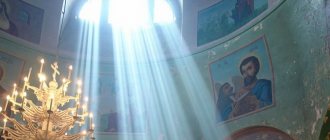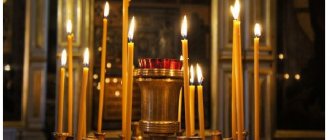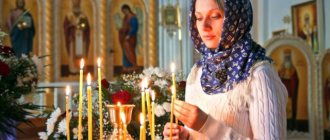TOP 10 Orthodox communities on VKontakte
VKontakte is one of the most popular social networks in the CIS, including among Orthodox Christians. We spend a lot of time searching social networks for interesting and useful information and do not always find what we are looking for.
To make the work of our readers easier, we present to them a selection of ten VKontakte communities that may be useful or cheer up, which can also be very important:
1. “I Believe † Orthodoxy” is considered the most popular Orthodox community on VKontakte. Its creators delight the community’s subscribers, of whom there are already more than 700,000, with quotes from the holy fathers, stories about holidays, churches and spiritual life, the work of church writers and other interesting materials. The community has only one significant drawback - it is public, which means you can only read it, but you won’t be able to communicate here.
2. The group “Orthodoxy † Ορθόδοξη Εκκλησία“ is devoid of this drawback. In addition to a variety of interesting content, a discussion function is available here and you can communicate on current topics in the area of your own spiritual life, as well as share interesting materials with other participants by posting them on the wall. The group’s motto: “Judge not, lest ye be judged” encourages participants to have conflict-free communication, which is why there are already more than 85,000 members.
3. “Orthodoxy” group is also one of the most popular communities of believers on VKontakte, with more than 80,000 members. Among the additional advantages of the group is the opportunity to ask participants for help or ask their questions to the priest. Drawing or literary competitions among participants are also often held here.
4. “Orthodox woman” - thematic community. This is a group not only for women, but also about women, which reveals to the world the soul of an Orthodox Christian. There are many touching stories from the lives of saints or the Christian experience of each of us. Also in the group you can often find articles from the Orthodox online magazine “Matrony.ru”.
“Orthodox Woman” is also a kind of dating club where you can find your soulmate. There are more than 80,000 people in the community.
5. “Orthodox psychology” is a thematic group dedicated to our inner world, interpersonal and family relationships. More than 55,000 participants who have the opportunity to solve their mental problems using the advice of priests and professional psychologists.
6. “†LENTEN MEAL. ORTHODOX LENTING RECIPES†“ - a group for those who want to learn how to cook Lenten food and, in general, a variety of Lenten dishes, learn about the essence and meaning of fasting, and also receive benefits for their soul, gleaned from patristic sayings and speeches of modern shepherds. The interest in this topic is evidenced by the number of subscribers, which has exceeded 90,000 people.
7. “Orthodox people are joking!” is the largest Orthodox humor group on VKontakte, which already has more than 80,000 members. Community members are offered funny pictures and photos, as well as short funny stories and jokes. The humor is high quality and decent. There is also the opportunity to offer something interesting yourself, chat with friends or ask for prayer support.
8. “[APS] Academy of Decent Seminarians” is a group with more than 15,000 members that positions itself as a “community of adequate Orthodoxy.” Her materials are mainly humorous or missionary in nature.
9. “Typical Sexton” is another good humorous group of Orthodox Christians. As the name suggests, its founders and main participants are clergy and Orthodox youth. Here you can not only read something funny, but also ask for advice on church life. They will definitely help you!
10. “Overheard in the Temple” is a group that is also dedicated to church humor, jokes and funny stories, with more than 6,500 members. The format of the popular public “Overheard” involves the anonymous publication of various stories, but in this community it has undergone some changes. Group members share events from their lives, ask each other for advice, and also publish various pictures and videos that seem funny to them.
Andrey Szegeda
You can applaud the author (at least 10 times)27
I'm afraid that there is no grace in the Church. Should we trust the elders?
Estimated reading time: 2 minutes.
Reader question:
Good afternoon Lately I have been overcome by despondency and fear that the last times have come, that there is no grace of our Lord in the Churches. It began with reading the prophecies of the elders, who said that the last times have come, that people living today will not be able to understand that there is no His Truth in the Church of Christ, and thus they will perish. That the Antichrist himself was at the Eighth Ecumenical Council. They named the time and approximate years when everything would happen. How to strengthen in the faith of Christ? And why did the Orthodox elders name the dates of the last times? Didn't the Lord forbid this?
Anna
Archpriest Andrei Efanov answers:
Archpriest Andrey EFANOV
Good afternoon
Dear Anna, in principle, we can limit ourselves to at least reminding that there were seven Ecumenical Councils in total (you can read about them, for example, the material of the 7 Ecumenical Councils, or if you want, look at textbooks on the history of the Church or any encyclopedia). If a person does not have such simple historical facts, what else can we talk about?
I don’t really understand why there is a need to instill fear. These “prophecies” appear from time to time, the essence is the same: grace has become scarce in the Church, but there is a certain “elder” and those around him, and they have grace. Yes of course. You will take a closer look at these “elders”, at those who are next to them, and remember that, for example, one of the points by which the ancient fathers advised to distinguish between spirits is the internal state that arises from contact with them.
What is your condition? “I was overcome by despondency and fear that the last times had come.” This is the answer.
Let’s leave these “elders” aside, it’s hard for me to say what they were called there and why. I only know that such prophecies from time to time roll over like a wave, catching people with not very strong nerves and not in the best internal state (by the way, it is very important how your life is going in principle now and what is inside you) - and now people go to these “elders”, their whole life is organized around the “elder”, finances, by the way, too. And when a person starts asking questions, they swear at him, shout at him and threaten him with excommunication from the “elder”. I intentionally write the word in quotation marks.
What to do? Close the texts “from the elders” and do not read them. Lead a regular, normal spiritual life: read morning and evening prayers, according to the chapter of the Gospel per day and chapter 1-2 of the Apostle (start with Acts, then go to the Epistles). If this pace is too fast, reduce the volumes in half or to a third, which is unclear - see the interpretations of St. Theophylact of Bulgaria, Lopukhin’s Explanatory Bible, then look, this is enough for now, I think. Confess to the same priest at least once a month and receive communion. In church, take part in every Sunday service; if possible, it would be good to participate in the all-night vigil the day before, on Saturday. Live in this mode for about three months, probably, to get used to it. You will “thaw out” a little, learn to reflect (and confession requires it), many things will become clearer. Take adult Sunday School to learn more about your faith. God willing, strengthen yourself and calm down.
God's help!
Priest, elder, spiritual father, Holy father, what's the difference?
Priest, Spiritual Father, Elder, Holy Fathers - there are many verbal names, but it is sometimes completely unclear to unchurched people what the differences are between them and who can help in this or that situation?
So, for example, one day adults came to our Temple - probably grandparents, and they were looking for a priest so that... he would call and congratulate their grandson on the New Year! And in my little priestly experience, similar, as it seems to me, very strange cases are accumulating more and more. Even sometimes it seems that people, alas, do not understand the deep meaning of priestly service at all.
Meanwhile, everyone has probably heard such spiritual titles as “priest”, “spiritual father”, “elder”, “Holy Fathers”. Who is this and what are their differences, I will try to explain very briefly.
Let's start with the fact that there are no holy people. Therefore, if you hear, for example, about the “sayings of the Holy Fathers” or that such and such a Holy Father said something, then know: we are talking about those who are no longer with us. Holy fathers are those who lived a life pleasing to God and, some time after death, were canonized (canonized) by the Holy Synod. This does not happen without the will of God, the process of canonization is quite complicated (often people were healed from the relics of a future saint with fragrance and there were other reliable facts of holiness), and we will not consider it now, but in reality there are no Holy Fathers here with us on earth , but their various works, letters, instructions remain, and they are very capacious, wise, authoritative, because they do not contradict the teachings of the Church, moreover, they clearly and clearly express the teachings of Christ. In addition, we, as Christians, understand that the Holy Fathers are alive not physically, but spiritually, continuing to serve God in the heavenly army and helping us both through prayer and direct intercession before God, and often miracles occur through the Saints here on earth .
So, a priest is a Christian who has accepted the spiritual order of the priesthood after certain spiritual labors of testing and receiving spiritual education, called by God to serve God and people. By the grace given to him from God, through the bishop he can perform all divine services and sacraments (with the exception of consecration, consecration of the world and antimensions). The Lord has endowed priests with special grace; it is through them that the Lord gives people the opportunity to participate in the Sacraments of the Church: Baptism, Confirmation, Confession, Communion, Unction, and Wedding. The Lord gave priests at their ordination special gifts of the Holy Spirit, as a result of which the priests develop spiritual reasoning, and it is the priests who are entrusted with the responsibility of teaching people the faith and showing them the way to God.
A spiritual father is a priest who regularly confesses to a specific person. As a result of this, a close spiritual connection quickly arises between a person and a clergyman. A person can ask for spiritual advice and questions to this priest. This is how the “priest” becomes a “spiritual father.” The relationship between a believer and a spiritual father is regulated independently; in some places it may be life on advice, in others it may take on a slightly different character. Spiritual life is impossible without a priest (spiritual father), to whom a person constantly confesses, because directly through the spiritual father the Lord reveals to a person circumstances that are very important for the person being confessed and gives reasons for reflection. Each clergyman (priest), in turn, also has his own spiritual father, to whom he confesses, and, believe me, in an amazing way, with equal age categories and spiritual experience, it is through the spiritual father that the Lord provides the answer to many of life’s questions. Therefore, choosing a permanent priest with whom a believer will confess is simply necessary.
An elder is an experienced ascetic with spiritual strength and wisdom. Eldership is a gift given by God to a spiritual ascetic. The Lord often reveals to the elders what is unknown to an ordinary person - for their great faith, humility, and self-abasement. An elder, as a rule, is a monk or a clergyman; he never exalts himself and never considers himself an elder, does not see perfection in himself and has his heart directed towards God. An elder is not a cute grandfather with a beard, not a wizard, but a guide to God and God’s providence, he is someone who can help simply with a word, because it is not from himself, but from God. An example of the Elder can be seen in the films posted in the gallery of our website: “The Word of the Elder”, “The Elder’s Advice to Adults and Children”.
To summarize, we can say that both the clergy and the elders are not Santa Clauses, not fulfillers of demands, not kind uncles, and not even those who distribute blessings left and right to fulfill desires in the name of human selfishness. First of all, these are servants of God, whose task is to lead a person to God, and, if necessary, then explain, tell, guide, instruct. And this is only possible if a person understands that the desires of people and the will of God can be very different - this hides a lot of the meaning of this material.
I recommend viewing the article: How to properly address priests










